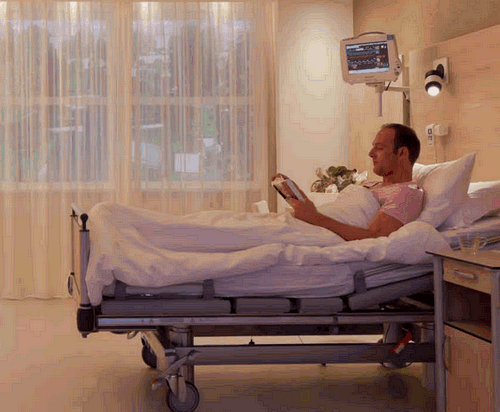A small study research has revealed patients in average hospital rooms are getting inadequate lighting exposure that it is affecting their bodies normal sleep-wake cycle, according to a Reuters report.
Researchers at Cleveland Clinic's Nursing Institute found that lowest levels of daytime light exposure was related to worse mood, more fatigue and pain in patients, compared to those with better-lit rooms during the day.
 |
|
A patient reading a book in a hospital room lit by Philips Heal Well lighting. (LEDinside/ Philips) |
"Until now, no one has looked at the associations among light and outcomes such as sleep, mood and pain experienced in the hospital," said Esther Bernhofer, lead author of the study and a nurse researcher at the Cleveland Clinic's Nursing Institute.
Bernhofer and colleagues gathered data from 40 men and women admitted to a large academic hospital between May 2011 and April 2012 to identify the correlation between light and patient’s healing. Patients wore a wrist device for 72 hours to measure sleep-wake patterns and light exposure, and completed questionnaires to evaluate mood and pain levels.
The researchers found that patients were exposed to low levels of light around the clock, including overnight and that most hospital patients slept poorly with frequent interruptions. On average, most patients received less than four hours of sleep per night. Patients with less light exposure during the day also reported feelings of being more depressed and fatigued than those with adequate lighting exposure.
On average, patients in the study were exposed to about 105 lux of light, this is far below that received in a normal office lighting of 500 lux, or a sunny day where people can receive 100,000 lux of exposure. Past studies found that a minimum of 1,500 lux for 15 minutes per day is necessary to establish a normal sleep-wake cycle but at least 4,000 lux over the course of eight hours is preferred for sleep health, Bernhofer's team writes in the Journal of Advanced Nursing.
More research is needed, but "Further findings might result in a cost-effective way to provide supportive therapy for sleep and pain - common issues in hospitalized patients affecting their ability to heal and be well," Bernhofer said.
"These findings are preliminary and should not dictate any policy or practice changes for healthcare institutions until more specific research can be done," Bernhofer added.
Manufacturers in healthcare lighting, such as Philips Lighting, might find this information supportive for their LED lighting products. In early October 2013, Philips released a series of reports on PSFK that discussed how lighting can affect people’s moods. The company also discussed how colorful LED lights might cheer up patients in its Future Lighting series.
"These findings are preliminary and should not dictate any policy or practice changes for healthcare institutions until more specific research can be done," Bernhofer added.
Manufacturers in healthcare lighting, such as Philips Lighting, might find this information supportive for their LED lighting products. In early October 2013, Philips released a series of reports on PSFK that discussed how lighting can affect people’s moods. The company also discussed how colorful LED lights might cheer up patients in its Future Lighting series.











